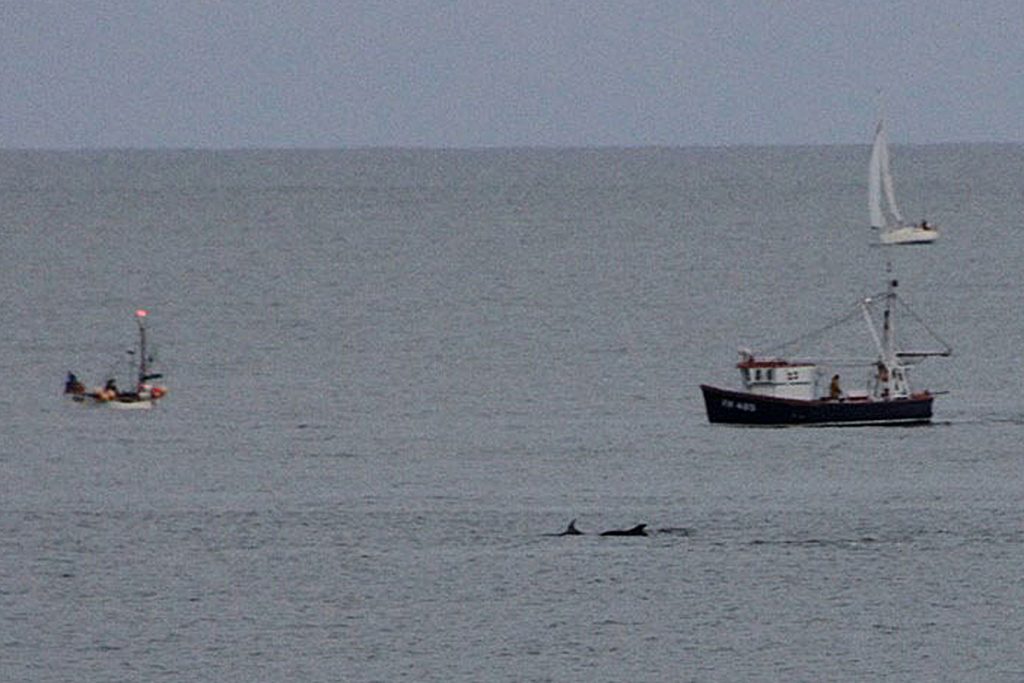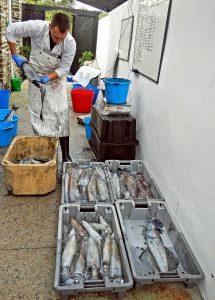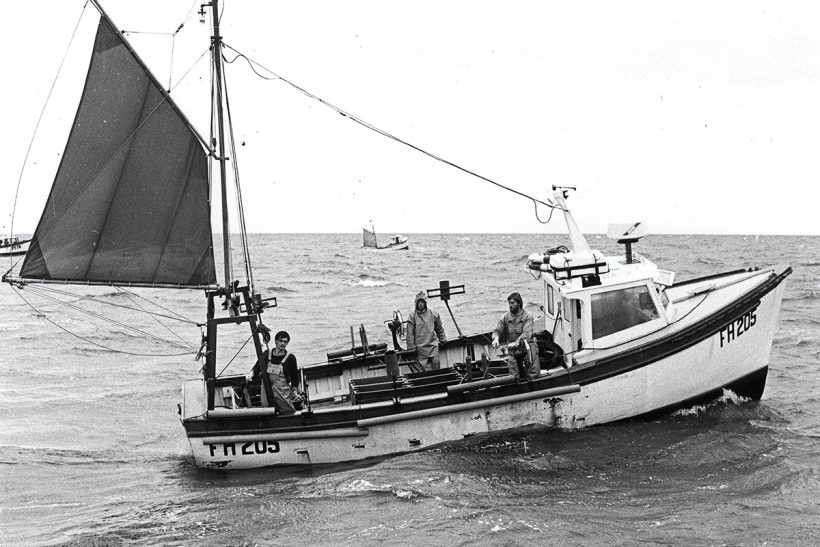Phil Lockley asks: “What have top-up cards got to do with squidding?”
Regarding the layout and style of my squid gear, each year I have a new idea. Some go right and some are a complete flop. And the same applies to places to fish.
Above: Squid-jigging in Cornwall is not a new fishery and here, just off Mevagissey, I saw boats without knowing what sort of fishery they were engaged in.
Scanning through my squid diaries, one incident that, in truth, was a flop, turned out to be a ‘sort of’ success. I won’t use any names.
Some years ago, I studied YouTube to see how the small squid-boats in the Far East were fishing right under the transom lights of ships. I mean right under – as close to the rudder as you can get. So, with a pal, I decided to try it.
The method really works well, although I have scratched a ship’s transom with my mizzenmast more than once – one reason why I removed that mast, which is now on a GM19 in Cardigan, on the Claire-B (skipper Dylan Brown).
Being a haven for ships, together with another fisherman, I caught sight of a ship anchored in Falmouth Bay; a ship that was fairly close to the shore and had been at anchor for some weeks. There were bright lights at the transom, and on deck we saw Filipino crewmen who were squid fishing. Great. Maybe we would learn something? We saw them haul-up silvery old table-forks with treble hooks attached to the end – the cheapest jigs possible – yet they were catching squid after squid. We got really excited, with pound notes ringing in our ears.
In a typical behaviour pattern, the squid wanted nothing to do with our slick Japanese-made jigs, and we almost blanked. We each caught a few squid and even tried drifting down the lea side of the ship where the light was equally strong – still just a couple of squid – they were ‘locked’ onto the transom lights and the table-fork jigs.
In broken English the crew asked us whether we could buy Vodaphone top-up cards for them? They hadn’t spoken to home for a while. If you have heard this tale before, please accept my apologies. My excuse for repeating things is often used – it’s just my age!

We had no idea that the dolphins were filling-up with ‘our’ squid.
We agreed to swap their squid for top-up cards, and the following morning the deal was done, up went the cards and down came two huge bags of squid. Those bags were big! The squid were very cold, almost frozen, but with the slick use of buckets and seawater, the following morning those squid graced the floor of a certain fish market. We were paid handsomely, there was no line-caught squid landed that day.
We kept the deal going for some time. Those squid landed with Amanda J tally sheets was hardly a Christian thing to do? It is a good job I’m not religious. However, the most valuable thing I learned was a simple question – are UK squid really attracted by light, either stationary or moving?
After 15 years of squidding, I still haven’t a clue. Some days they are attracted to light, and in your deck light shadow you can see them in a pack, tightly gathered a couple of fathoms down. Some days the deck lights just scare them. Turn off those lights and the squid return.
But with that transom light, or other lights, blaring away in almost the same position night after night, any such ship at anchor becomes a perfect ‘killing field’. However, only when that ship has been there for many days. I have never caught squid under the fuel bunkering ships in Falmouth Bay that are constantly on the move, waiting at anchor only between fuel bunkering.
When our generous squid-ship left Falmouth Bay, we went to another ship, one with Spanish crewmen. That ship had also been at anchor for a while and we did catch well at the transom. The Spanish crewmen were fishing too, but were using far better jigs than the Filipino crewmen on the previous ship. However, the hauls from the Spanish crewmen were not so impressive; it was a much smaller ship having fewer stern lights.
We did try to do a similar ‘goods for squid’ swap with those crewmen, but they were having nothing to do with that idea. They ate whatever they caught. The worst thing was the Spanish cook getting the evening meal ready; the smell of squid paella was drifting out, and we had nothing but ham sandwiches and crisps!
Almost everyone who has entered this mysterious world of UK squid-jigging has ordered some sort of underwater light. Some say green LED is best, others saying blue; I’m not sure whether a light fixed to a drifting boat is worth it. I truly believe that squid have to have that light in the same place for quite a few nights before falling for the trick.
Perhaps if such a triggering light is anchored to the seabed and you fished over it night after night, you may hit a trend. Sadly, here in Falmouth Bay it would be stolen within hours.
Generally, I keep the deck lights on and reckon that the squid are not attracted to the light, but stay within the shadow, well outside the beam, and attack anything swimming into the beam. Without doubt, light attracts feed-fish and I have often seen this occur.
If you do have a hit, as the boat drifts the lines are at an increasing angle away from you and when you haul the squid toward the hull it’s within the deck light’s beam. It is here where you will see the ferocious feeding behaviour of squid. You may also see other squid following any of the empty jigs, and, as you haul, watch them take. Again, Jack’s rule: ‘deny them the lure’. Stop pulling the line and they lose interest.
Also, you will see squid taking chunks out of other squid that are attached to the jigs; the hunting of squid is a phenomenal sight. In Cornwall, we use a ‘fiddling stick’ – a short piece of rod with two barbless trebles attached at the end – often you can ‘take’ those free squid by hooking them out. I have heard the old skippers talk of sessions when they hauled-out a greater number of squid in such a way.
My final thoughts have no scientific proof, but are based on common sense, well, my version of common sense.
One night, together with another Falmouth boat (aptly named the Leviathan) we were squidding close to Falmouth harbour, but unlike previous nights hardly any squid were caught. It was November – the very best time – I had fished that morning and taken 40kg or so, and at £7/kg I was very pleased.
On returning home from that nearly blank night, I had a call from a diving pal asking me whether I had seen any other boats there. I said yes, and that I had seen what seemed to be a diving charter-boat with people on the foredeck eagerly pointing at something.
He told me that it was a nature-watch boat with scientists aboard using night-vision cameras in search of dolphins. They had followed dolphins most of the day. And on seeing those night-vision images, it revealed that the Leviathan and the Amanda J were surrounded by small packs of dolphins.

My morning catch of squid, destined for high-class London restaurants.
Dolphins use sonar detection and ping with frequencies similar to sounders, I am told. I can see why squid quickly leave the scene if they detect dolphins, but do they do so when there are no dolphins but our dual-frequency sounders are putting out dolphin-like noises? I think so. And why?
At that particular spot, it’s like Paddington Station when the word of squid catches gets out. Measured against hordes of leisure boats, only a few commercial boats are present, however, everybody has sounders blasting away.
When there are so many boats, very often we catch a few squid just before the sun rises and then nothing after that – a valuable dawn comes to nothing.
However, by 10am when no squid have been caught, the leisure boats leave, and normally just two or three commercial boats remain. That’s when it all happens. I’ve had my best hits in daylight just after that fleet of boats has left. It is like a switch turning on.
Is it because those squid (that would normally feed in the darkness or first-light) have changed their behaviour to become daytime feeders NOT because of sounders? Or is it that the sounders trigger such a change? I think the latter is true. That theory may be nonsense; perhaps squid cannot even detect such signals, but I think they can. Once I know the ground and put the potential hitches on my track plotter, I do not use the sounder.
I seriously hope you give squid jigging a go. Each area may have totally different trends, but there are always masters of that region that may help you, and I strongly advise you use good gear; an issue I will chat about in the next piece.
Read more from Fishing News here.






